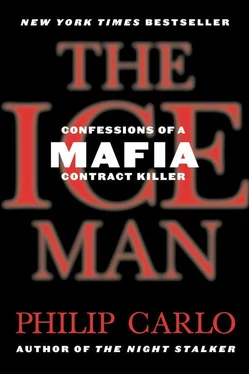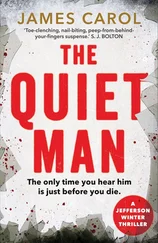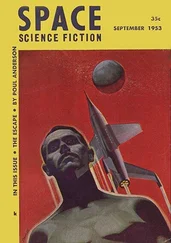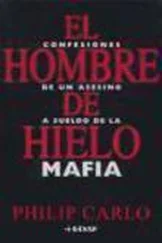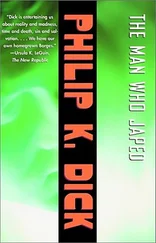60. No Sunset, No Sunrise
Today, Richard is still housed in the maximum-security unit at the Trenton State Prison. To control his mercurial temper he is given daily doses of Ativan and Paxil, once in the morning, once at night. These drugs, for the most part, make him placid and easygoing.
At all meals, Richard shares a table with three mob guys, all skippers (captains), all of them are serving life sentences. They regularly share war stories about the days when they were free, the women they knew, the great food they ate, the wonderful places they saw, their appeals, sports, the mistakes they made to wind up in prison.
For Richard there are no sunrises, no sunsets. From his tiny cell at the Trenton State Prison he cannot see outside, cannot see the sky, the sunrise or the sunset. He never goes outside. Life for him is a monotonous regimen that rarely, if ever, varies. When recently asked if he had any regrets he said, “I wish I had taken another path in life, been a good husband and father; but that… that wasn’t in the cards.”
Barbara Kuklinski lives with daughter Chris and Chris’s son, John, in southern New Jersey. Barbara never remarried. She has severe arthritis of the spine and is in constant pain; her condition prevents her from working.
When Barbara talks about her life with Richard, her hands still tremble and she gets angry. She regrets, she says, ever having met Richard. She recently explained: “When Richard was in a good mood, he was the best husband any woman could have had. When he was in a bad mood, he was cruel beyond description. I’ve gotten used to being alone. I have my children, my grandchildren—and they are the only ones in this world who mean anything to me. I’m… I’m very thankful for them.”
Chris Kuklinski still holds what her father did against him. She only wishes he’d been arrested sooner. “I always knew,” she said, “he could be mean, you know, I mean I saw it, I grew up with it, but I never imagined he was… he was a cold-blooded monster, a hit man for the Mafia.” Shaking her head sadly, she continued: “He is where he belongs. I think even he realizes that.”
Richard’s son, Dwayne, doesn’t think much about his father. He is happy. He has a good job as an electrician and is marrying his longtime sweetheart, settling down, and having a family of his own.
Merrick Kuklinski deeply misses her father, still loves him dearly. She is quick to defend him, readily points out how life was stacked against him from the very beginning. “I’m not making excuses for him,” she recently said. “But the truth is my father didn’t have a chance. When you look at what he went through, the childhood he had, it’s not such a big surprise he turned out the way he did. I love him—I love him with all my heart and soul. He was, for me, a wonderful father. I will never ever forget how he was always there for me, how he helped sick children who had nothing in the hospitals where I often was as a child. He couldn’t see a child suffer without wanting to help, running to help—doing something. I saw him bring children he didn’t know food and toys and clothes without ever being asked. No other dad ever did that! He was no Ice Man. He was a caring, giving man with a heart as big and warm as the sun. For me, my father was the nicest, most giving man I ever knew. I will go to my grave believing that! I love him very much.”
When Richard was asked recently what he would like to say for the close of this, his story, he said: “I’d rather be known as a nice man, not the Ice Man.”
Upon reflection Richard added: “I was made. I didn’t create myself. I never chose to be this way, to be in this place. Yeah, I for sure wish my life took another turn, that I had an education and a good job, but none of that was in the cards for me. I am what I am, and the truth is I don’t give a flying fuck what anyone thinks about me,” said Richard “the Ice Man” Kuklinski, formerly of Jersey City, New Jersey, the second born to Anna and Stanley Kuklinski.
EPILOGUE
The Melting of the Ice Man
March 13, 2006
Richard Kuklinski died at St. Vincent’s Hospital in Trenton, New Jersey, on Sunday morning, March 5, 2006 at 1:03 A.M. At this point the exact cause of his death has not been definitively determined, although the timing of his passing is particularly suspect, for the day after he died the charges against Sammy “the Bull” Gravano—that he ordered the murder of NYPD Detective Peter Calabro—were dropped by the Bergen County Prosecutor’s Office. Those in the know believe that this was not a coincidence. The famed medical examiner, Dr. Michael Baden, on behalf of the Kuklinski family, has requested toxicology tests to see if, in fact, Richard was poisoned or if he died of natural causes.
Richard’s health began to deteriorate in late October 2005. Supposedly, two doctors at Trenton State Prison each ordered different blood pressure medicines, which were administered to Richard simultaneously, causing Richard’s potassium and electrolyte count to become “dangerously low.” He began passing out and experiencing vertigo. He was removed from his cell and placed in the infirmary. His health continued to decline, and his blood pressure dropped. He was taken to St. Vincent’s hospital for a period of thirty hours, then “signed himself out,” an official at the prison said, and he was returned to Trenton Prison’s infirmary. Richard called me and told me that he believed he was being poisoned, and that I should call the media. I assumed that he was delusional, and told him I’d do what I could. What I did do was discuss this with Barbara Kuklinski and we decided Richard was imagining things. His health, however, continued to decline and he stopped eating. His speech, I noted when he called, was slurred. He was brought back to St. Vincent’s again, and doctors observed that his lungs were congested and that his kidneys were failing. He was tentatively diagnosed as having Wegener’s disease, a rare, potentially lethal malady that, if treated with drugs, is not fatal.
Richard’s health continued to get worse. He suddenly developed a form of dementia, experienced loss of memory, and had a skin rash on his hands and legs; he also refused to eat. Doctor Wong from the hospital called Barbara and told her he was doing all he could, and he first gave a diagnosis of Wegener’s disease. He said that they were also going to do a CAT scan of Richard’s brain to see if he had a stroke… perhaps the cause for his dementia. At this point Richard couldn’t even remember Barbara’s phone number. This was very odd considering that Richard had a very good memory when it came to numbers, as Barbara put it. Doctor Wong also said they were performing a biopsy on Richard’s kidney.
The CAT scan indicated no stroke. The biopsy indicated no cancer. Yet, Richard’s health continued to decline. His blood pressure fluctuated abnormally: first it was high, then low.
The holidays, Thanksgiving, Christmas, New Year’s, all passed, and Richard didn’t call his family, as he always had done. The family became very concerned. I now tried to visit Richard at the hospital, but was told by a prison official that was not possible, that only immediate family could visit. Barbara and Chris did go to see him and were shocked by his gaunt appearance due to his loss of weight.
“It looked,” Barbara recently explained, “like he lost a hundred pounds. He spoke in little more than a whisper. He told us ‘they’re trying to kill me,’ that we should call the police; ‘call the media,’ he said. At this point I thought—perhaps incorrectly, I’m thinking now—that he was just delusional. The police were there, I mean guarding him, three guys in plainclothes and two uniform cops. He was in a nice room at the end of the hall. We sat there for forty-five minutes. He was drifting in and out. He then said, ‘If I don’t leave the hospital it’s because I was murdered.’”
Читать дальше
